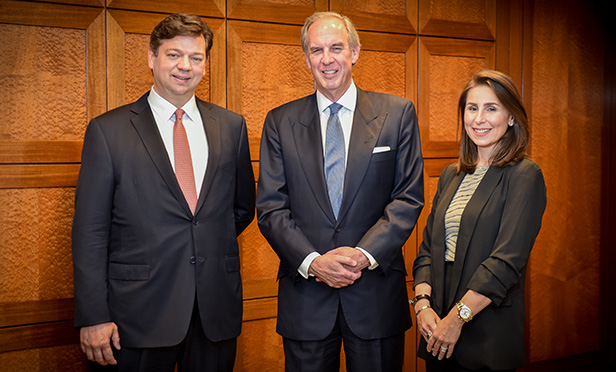Litigation Department of the Year, Finance: Cravath, Swaine & Moore
As litigation relating to the financial crisis slows down, different trends are beginning to emerge, such as the wave of litigation seeking to hold banks liable for alleged antitrust and Anti-Terrorism Act violations.
October 03, 2018 at 04:15 PM
4 minute read
 From left, partners Michael T. Reynolds, Richard W.
From left, partners Michael T. Reynolds, Richard W.
Clary and Lauren A. Moskowitz (Photo by David Handschuh/NYLJ)
Q: What are some of the department's most satisfying successes of the past year and why?
Cravath has been fortunate to share a number of successes with our clients over the past year. For American Express, we won before the U.S. Supreme Court in a lawsuit originally brought by the DOJ and 17 state attorneys general challenging certain provisions in AmEx's merchant agreements. The ruling defines how antitrust law will be applied to two-sided markets, which are increasingly prevalent in today's business environment, and confirms a momentous Second Circuit victory on the long road Cravath traveled with AmEx in defense of the company's business model.
For Credit Suisse, we eliminated billions of dollars in RMBS claims against the company, and in 2017 tried only the second RMBS investor action ever to go to trial, which ultimately settled, as well as another RMBS lawsuit that settled on the first day of trial. We also argued on behalf of Credit Suisse before New York's highest court in a lawsuit brought by the New York attorney general relating to $40 billion in RMBS and won a landmark decision regarding the statute of limitations under the Martin Act.
Q: A prospective client in crisis calls and asks why your team should be retained. What is your answer?
A: Cravath's goal is to be our clients' first call to address their most challenging legal issues and critical disputes. Our generalist training means Cravath litigators have the tools to tackle complex cases from every angle, which allows us to staff matters leanly with experienced attorneys at every level. We customize strategy and tactics to every client and situation, learning our clients' business objectives and culture in order to provide short- and long-term solutions. As a result, we are not just legal advisers—we are our clients' partners in developing creative and workable solutions to the wide range of issues they face.
Q: What traits do you respect most in opposing firms and lawyers?
A: What we value in other firms is a reflection of what we value in ourselves. We appreciate going up against opposing firms and lawyers who, like our firm, are strong advocates for their clients while always acting professionally.
Q: What sorts of trends are you seeing in litigation, and what do you think will be the most important development in the law/legal business that will impact your field in the next 10 years?
A: As litigation relating to the financial crisis slows down, different trends are beginning to emerge, such as the wave of litigation seeking to hold banks liable for alleged antitrust and Anti-Terrorism Act violations. With the rapidly growing economy and advancements in technology, we are seeing new ways of doing business as well as cross-industry developments, which create new legal challenges. Firms that wish to tackle these challenges must understand their clients' long-term business goals and avoid a myopic view of the legal issues in front of them.
Q: What is the firm doing to ensure that future generations of litigators are ready to take the helm?
A: Cravath associates have been trained through our hallmark rotation system for decades. By working with different partners across different practice areas at all stages of litigation, the system exposes associates to a variety of legal issues, industries and advocacy styles. This comprehensive training enables attorneys to develop the generalist skills, creativity and confidence to successfully navigate even the most challenging circumstances. Through formal and informal mentorships, associates obtain additional support throughout their time at the firm. In addition, the firm recently developed an in-depth, multi-phased orientation program to educate new Cravath partners, which will help ensure the smooth succession of leadership from generation to generation.
This content has been archived. It is available through our partners, LexisNexis® and Bloomberg Law.
To view this content, please continue to their sites.
Not a Lexis Subscriber?
Subscribe Now
Not a Bloomberg Law Subscriber?
Subscribe Now
NOT FOR REPRINT
© 2025 ALM Global, LLC, All Rights Reserved. Request academic re-use from www.copyright.com. All other uses, submit a request to [email protected]. For more information visit Asset & Logo Licensing.
You Might Like
View All
Benjamin West and John Singleton Copley: American Painters in London
8 minute read
'A Regressive Institution': SDNY Judge Rakoff Delivers Pointed Remarks on SCOTUS in Recent Appearance
2 minute read
Federal Court That Faces Its Share of Real-Life Horrors Gets Into Halloween Spirit
1 minute readTrending Stories
- 1States Accuse Trump of Thwarting Court's Funding Restoration Order
- 2Microsoft Becomes Latest Tech Company to Face Claims of Stealing Marketing Commissions From Influencers
- 3Coral Gables Attorney Busted for Stalking Lawyer
- 4Trump's DOJ Delays Releasing Jan. 6 FBI Agents List Under Consent Order
- 5Securities Report Says That 2024 Settlements Passed a Total of $5.2B
Who Got The Work
J. Brugh Lower of Gibbons has entered an appearance for industrial equipment supplier Devco Corporation in a pending trademark infringement lawsuit. The suit, accusing the defendant of selling knock-off Graco products, was filed Dec. 18 in New Jersey District Court by Rivkin Radler on behalf of Graco Inc. and Graco Minnesota. The case, assigned to U.S. District Judge Zahid N. Quraishi, is 3:24-cv-11294, Graco Inc. et al v. Devco Corporation.
Who Got The Work
Rebecca Maller-Stein and Kent A. Yalowitz of Arnold & Porter Kaye Scholer have entered their appearances for Hanaco Venture Capital and its executives, Lior Prosor and David Frankel, in a pending securities lawsuit. The action, filed on Dec. 24 in New York Southern District Court by Zell, Aron & Co. on behalf of Goldeneye Advisors, accuses the defendants of negligently and fraudulently managing the plaintiff's $1 million investment. The case, assigned to U.S. District Judge Vernon S. Broderick, is 1:24-cv-09918, Goldeneye Advisors, LLC v. Hanaco Venture Capital, Ltd. et al.
Who Got The Work
Attorneys from A&O Shearman has stepped in as defense counsel for Toronto-Dominion Bank and other defendants in a pending securities class action. The suit, filed Dec. 11 in New York Southern District Court by Bleichmar Fonti & Auld, accuses the defendants of concealing the bank's 'pervasive' deficiencies in regards to its compliance with the Bank Secrecy Act and the quality of its anti-money laundering controls. The case, assigned to U.S. District Judge Arun Subramanian, is 1:24-cv-09445, Gonzalez v. The Toronto-Dominion Bank et al.
Who Got The Work
Crown Castle International, a Pennsylvania company providing shared communications infrastructure, has turned to Luke D. Wolf of Gordon Rees Scully Mansukhani to fend off a pending breach-of-contract lawsuit. The court action, filed Nov. 25 in Michigan Eastern District Court by Hooper Hathaway PC on behalf of The Town Residences LLC, accuses Crown Castle of failing to transfer approximately $30,000 in utility payments from T-Mobile in breach of a roof-top lease and assignment agreement. The case, assigned to U.S. District Judge Susan K. Declercq, is 2:24-cv-13131, The Town Residences LLC v. T-Mobile US, Inc. et al.
Who Got The Work
Wilfred P. Coronato and Daniel M. Schwartz of McCarter & English have stepped in as defense counsel to Electrolux Home Products Inc. in a pending product liability lawsuit. The court action, filed Nov. 26 in New York Eastern District Court by Poulos Lopiccolo PC and Nagel Rice LLP on behalf of David Stern, alleges that the defendant's refrigerators’ drawers and shelving repeatedly break and fall apart within months after purchase. The case, assigned to U.S. District Judge Joan M. Azrack, is 2:24-cv-08204, Stern v. Electrolux Home Products, Inc.
Featured Firms
Law Offices of Gary Martin Hays & Associates, P.C.
(470) 294-1674
Law Offices of Mark E. Salomone
(857) 444-6468
Smith & Hassler
(713) 739-1250







